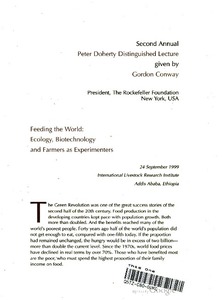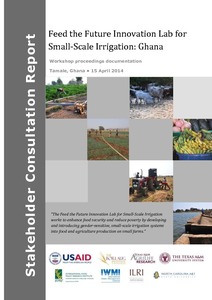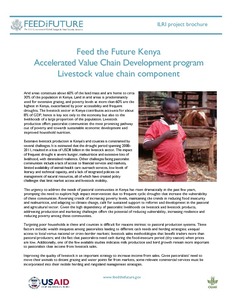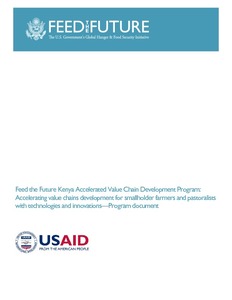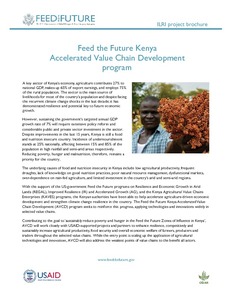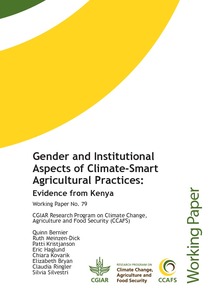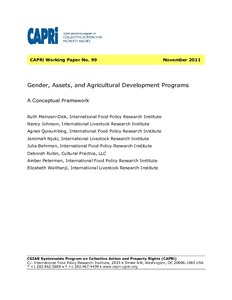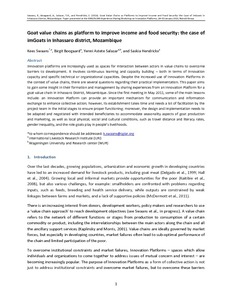Feed the future innovation lab for small-scale irrigation, Ghana: Workshop proceedings and documentation, Tamale, Ghana, 15 April 2014
Feed the Future Kenya Accelerated Value Chain Development Program: Accelerating value chains development for smallholder farmers and pastoralists with technologies and innovations—Program document
Feed the Future Kenya: Accelerated Value Chain Development program
Gender and Institutional Aspects of Climate-Smart Agricultural Practices: Evidence from Kenya
This paper analyses gender differences in awareness and adoption of climate-smart agricultural (CSA) practices. It examines what factors are associated with the likelihood of adoption of a wide range of CSA practices for 376 women and 375 men in two different areas of Kenya. This information is aimed at improving the targeting and design of interventions that are trying to achieve greater and more equitable agricultural development in East Africa and elsewhere.
Gender, Assets, and Agricultural Development Programs: A Conceptual Framework
Being able to access, control, and own productive assets such as land, labor, finance, and social capital enables people to create stable and productive lives. Yet relatively little is known about how agricultural development programs can most effectively deliver these outcomes of well-being, empowerment, and higher income in a way that acknowledges differential access to and control over assets by men and women.
Global linkages among energy, food and water: an economic assessment
The resolution adopted by the General Assembly of the United Nations on 25 September 2015 is symptomatic of the water-energy-food (WEF) nexus. It postulates goals and related targets for 2030 that include (1) End hunger, achieve food security and improved nutrition, and promote sustainable agriculture (SDG2); (2) Ensure availability and sustainable management of water and sanitation for all (SDG6); and (3) Ensure access to affordable, reliable, sustainable, and modern energy for all (SDG7).
Global linkages among energy, food and water: an economic assessment
The resolution adopted by the General Assembly of the United Nations on 25 September 2015 is symptomatic of the water-energy-food (WEF) nexus. It postulates goals and related targets for 2030 that include (1) End hunger, achieve food security and improved nutrition, and promote sustainable agriculture (SDG2); (2) Ensure availability and sustainable management of water and sanitation for all (SDG6); and (3) Ensure access to affordable, reliable, sustainable, and modern energy for all (SDG7).
Goat value chains as platforms to improve income and food security: The case of imGoats in Inhassaro District, Mozambique
Innovation platforms are increasingly used as spaces for interaction between actors in value chains to overcome barriers to development. It involves continuous learning and capacity building – both in terms of innovation capacity and specific technical or organizational capacities. Despite the increased use of Innovation Platforms in the context of value chains, there are several questions regarding their practical implementation.
Global food demand and the sustainable intensification of agriculture
Global food demand is increasing rapidly, as are the environmental impacts of agricultural expansion. Here, we project global demand for crop production in 2050 and evaluate the environmental impacts of alternative ways that this demand might be met. We find that per capita demand for crops, when measured as caloric or protein content of all crops combined, has been a similarly increasing function of per capita real income since 1960. This relationship forecasts a 100–110% increase in global crop demand from 2005 to 2050.

